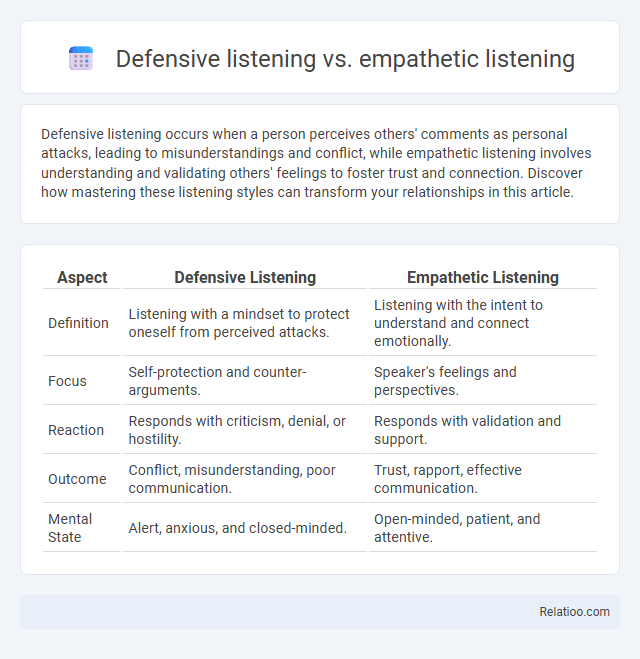Defensive listening occurs when a person perceives others' comments as personal attacks, leading to misunderstandings and conflict, while empathetic listening involves understanding and validating others' feelings to foster trust and connection. Discover how mastering these listening styles can transform your relationships in this article.
Table of Comparison
| Aspect | Defensive Listening | Empathetic Listening |
|---|---|---|
| Definition | Listening with a mindset to protect oneself from perceived attacks. | Listening with the intent to understand and connect emotionally. |
| Focus | Self-protection and counter-arguments. | Speaker's feelings and perspectives. |
| Reaction | Responds with criticism, denial, or hostility. | Responds with validation and support. |
| Outcome | Conflict, misunderstanding, poor communication. | Trust, rapport, effective communication. |
| Mental State | Alert, anxious, and closed-minded. | Open-minded, patient, and attentive. |
Understanding Defensive Listening
Defensive listening occurs when you interpret messages as personal attacks, leading to anxiety or hostility that impairs effective communication. Empathetic listening, by contrast, involves fully understanding and validating the speaker's feelings, fostering trust and deeper connection. Understanding defensive listening helps you recognize barriers to open dialogue and develop strategies to respond with empathy rather than defensiveness.
Key Traits of Defensive Listeners
Defensive listeners often perceive neutral or constructive feedback as personal attacks, leading to heightened sensitivity and a tendency to interrupt or rebut prematurely. Key traits include resistance to differing viewpoints, quickness to judge speaker intent negatively, and a focus on self-protection rather than understanding. Your ability to recognize these behaviors can help shift towards more empathetic listening, fostering better communication and reduced misunderstandings.
The Impact of Defensive Listening on Communication
Defensive listening, characterized by perceiving messages as personal attacks, significantly hinders effective communication by creating barriers of mistrust and misunderstanding. Unlike empathetic listening, which fosters understanding and emotional connection, defensive listening triggers defensive reactions that escalate conflicts and reduce openness. This reactive mindset impairs collaboration and problem-solving, ultimately diminishing the quality and clarity of interpersonal exchanges.
What Is Empathetic Listening?
Empathetic listening involves fully focusing on the speaker's emotions and perspective, aiming to understand their feelings without judgment or interruption. Unlike defensive listening, which filters messages through personal biases and prepares counterarguments, empathetic listening fosters genuine connection and trust. This active, compassionate engagement enhances communication effectiveness and emotional support.
Core Principles of Empathetic Listening
Empathetic listening centers on understanding the speaker's emotions and perspectives without judgment, fostering genuine connection and trust. Unlike defensive listening, which involves self-protection and resistance to criticism, empathetic listening requires active engagement and emotional attunement to the speaker's experience. Core principles include attentiveness, nonverbal cues awareness, reflective feedback, and withholding immediate evaluation to create a safe communication environment.
Defensive vs Empathetic Listening: Major Differences
Defensive listening occurs when a person perceives criticism or threat in a message, leading to a guarded or hostile response, whereas empathetic listening involves actively understanding and validating the speaker's emotions without judgment. Defensive listeners focus on protecting themselves from perceived attacks, often distorting the message, while empathetic listeners aim to build trust and rapport by demonstrating genuine care and emotional support. The major difference lies in the mindset: defensive listening prioritizes self-protection, whereas empathetic listening prioritizes connection and comprehension.
Why People Engage in Defensive Listening
People engage in defensive listening primarily due to fear of criticism or misunderstanding, leading them to interpret messages as personal attacks. This behavior often stems from insecurity, past negative experiences, or a lack of trust in the speaker, causing a protective barrier during communication. Defensive listening can hinder effective dialogue and contrasts with empathetic listening, which seeks to understand emotions and intentions without judgment.
Benefits of Practicing Empathetic Listening
Empathetic listening enhances your communication by fostering genuine understanding and emotional connection, which reduces conflicts and builds trust in relationships. Unlike defensive listening, which can create barriers and escalate misunderstandings, empathetic listening encourages openness and validation of others' feelings. Practicing this skill improves collaboration and emotional intelligence, leading to more productive and harmonious interactions.
Strategies to Shift from Defensive to Empathetic Listening
Shifting from defensive to empathetic listening involves consciously adopting non-judgmental attitudes and focusing on understanding the speaker's emotions and perspectives without immediate rebuttal. Strategies include active listening techniques such as paraphrasing, asking open-ended questions, and maintaining eye contact to demonstrate genuine interest and reduce personal biases. Practicing mindfulness and self-awareness helps identify triggers for defensive responses, allowing for a more compassionate and open communication environment.
Enhancing Relationships Through Better Listening Skills
Empathetic listening involves actively understanding and sharing the feelings of the speaker, which fosters trust and strengthens interpersonal connections, while defensive listening, characterized by perceiving comments as personal attacks, often hinders effective communication and damages relationships. Enhancing relationships through better listening skills requires shifting from defensive listening to empathetic listening, promoting open dialogue and emotional support. Mastering empathetic listening techniques increases emotional intelligence and creates a safe space for honest conversations, essential for building lasting relationships.

Infographic: Defensive listening vs Empathetic listening
 relatioo.com
relatioo.com